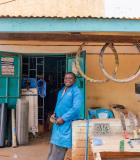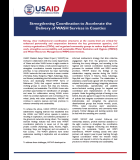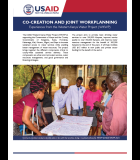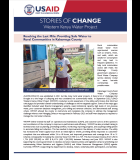Water, Sanitation, and Hygiene Plus – Kenya (WASHplus-Kenya)
The WASHplus project in Kenya supported the Ministry of Health and its partners to scale up improved water, sanitation, and hygiene (WASH) practices and incorporated them into HIV policies and interventions.
The project worked closely with communities, encouraging households to identify small doable actions they can take to improve health and prevent diarrhoea. The small doable actions included treating and storing drinking water safely, washing hands with soap at critical times, increasing use of latrines, and managing menstrual hygiene to prevent HIV transmission.
The program worked with the Ministry of Health, the National AIDS and STI Control Program (NASCOP), the Community Health Services Unit as well as partners of the US Centers for Disease Control and Prevention (CDC) and implementers of USAID’s AIDS, Population and Health Integrated Assistance program (APHIAplus).
Two components of the WASHplus program—integrating WASH into HIV and advancing improved sanitation uptake—worked together to improve WASH practices of communities, families, and individuals, with a special focus on the most vulnerable individuals and populations.
Activity Description
As a national mechanism, WASHplus program in Kenya, did not directly implement field activities, but provided technical assistance to the government and NGOs to integrate improved WASH practices into HIV policies and interventions in Kenya. The project supported integration of WASH activities into the Community Strategy using a small doable action approach. The approach enabled households to identify feasible actions they can take to improve health and prevent diarrhoea. These small doable actions included treating and storing drinking water safely, washing hands with soap at critical times, and increasing use of latrines. Another area of focus was menstrual hygiene management to prevent HIV transmission. Implementers of WASH-HIV integration encouraged households to take this incremental approach to move closer to ideal practices. Project activities included supporting or developing alternative sanitation options for people who were too weak to use a latrine.
WASHplus promoted behavior change to improve sanitation uptake. In line with the government’s efforts to community led-total sanitation, WASHplus developed a “plus” component that promoted hand washing with soap and inclusive sanitation. Specific activities focused on implementing a CLTS+ component in targeted districts and identifying and testing approaches to encourage households to adopt an improved latrine at the outset.
Actual Outcomes
- Developed WASH-HIV integration manuals and job aids for community health workers
- Sensitized and trained government and NGO actors at policy and implementation levels in all counties
- Trained 580 facilitators from the Ministry of Health (MOH) and NGOs, including implementers of the USAID-supported AIDS, Population and Health Integrated Assistance (APHIAplus) program and partners in programs supported by US Centres for Disease Control (CDC) in all 47 counties
- Introduced WASH-HIV integration strategies and activities in policy documents and guidelines.
- Developed strong relationships with the MOH and its partners
- Continued to support national and county interagency coordinating committees (ICC) and convened the national Hygiene Promotion Technical Working Group
- Promoted the small doable action concept, now accepted by government actors involved in WASH interventions
- Mainstreamed menstrual hygiene management in WASH interventions
- Conducted baseline survey to support WASH-HIV integration rollout at community level in three sub-counties
- Documented and disseminated success stories on small doable actions.





